
Journal of Pathology Clinical Research
Scope & Guideline
Advancing the Frontiers of Pathology and Forensic Medicine
Introduction
Aims and Scopes
- Integration of Pathology and Technology:
The journal emphasizes the use of advanced technologies such as artificial intelligence (AI), deep learning, and digital pathology to enhance diagnostic capabilities and improve patient management. - Biomarker Discovery and Validation:
A core area of focus is the identification and validation of prognostic and predictive biomarkers that can guide treatment decisions and improve patient outcomes across various cancer types. - Tumor Microenvironment and Immune Response:
Research exploring the interaction between tumors and their microenvironment, particularly the role of immune cells and stromal components in cancer progression and treatment response, is a critical focus. - Molecular and Genetic Profiling:
The journal publishes studies on the molecular and genetic characterization of tumors, which aids in understanding disease mechanisms and personalizing therapy. - Clinical Applications of Pathology:
A strong emphasis is placed on studies that translate laboratory findings into clinical practice, ensuring that research has direct implications for patient care.
Trending and Emerging
- Artificial Intelligence in Pathology:
The integration of AI and machine learning in pathology is rapidly gaining momentum, with a growing number of studies focusing on how these technologies can enhance diagnostic accuracy and predict treatment responses. - Immune Checkpoint Inhibitors and Tumor Microenvironment:
Research on immune checkpoint inhibitors and their interactions with the tumor microenvironment is emerging as a critical area of investigation, particularly in understanding resistance mechanisms and optimizing immunotherapy. - Multi-Omics Approaches:
There is an increasing trend towards multi-omics approaches that combine genomics, proteomics, and transcriptomics to provide a more comprehensive understanding of cancer biology and treatment responses. - Digital Pathology Innovations:
The rise of digital pathology, including automated image analysis and telepathology, is reshaping the field, with studies focusing on the development of tools and methodologies to enhance diagnostic workflows. - Personalized Medicine and Genomic Profiling:
Emerging themes include the application of personalized medicine through genomic profiling to tailor treatments based on individual tumor characteristics, reflecting a shift towards more individualized patient care.
Declining or Waning
- Traditional Histopathological Techniques:
There is a noticeable decrease in studies solely focused on traditional histopathological techniques without integration of modern technologies, as the field moves towards more quantitative and technology-driven methodologies. - Single Biomarker Studies:
Research focusing on single biomarkers without considering the broader context of multi-omics approaches or immune profiling is becoming less frequent, indicating a shift towards more comprehensive analyses. - Basic Descriptive Studies:
The prevalence of studies that provide basic descriptive data without significant insights into mechanisms or clinical implications appears to be waning, as the journal favors more impactful, hypothesis-driven research. - Generic Cancer Types:
Publications centered around generic cancer types without specific molecular or genetic insights are declining, as more targeted studies on unique subtypes gain traction.
Similar Journals
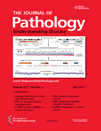
JOURNAL OF PATHOLOGY
Unveiling Innovations in Pathology and Forensic MedicineWelcome to the Journal of Pathology, a premier academic publication specializing in the field of pathology and forensic medicine. Established in 1969 and published by Wiley, this journal has garnered significant recognition within the research community, reflected in its impressive ranking of #6 out of 208 in Scopus, placing it in the 97th percentile. The Journal of Pathology serves as a critical platform for disseminating cutting-edge research findings, innovative methodologies, and topical reviews that advance our understanding of diseases and their underlying mechanisms. With no open access charge, this esteemed journal is committed to maintaining the highest standards of scientific rigor and integrity. As a Q1 journal in its category for 2023, it continues to shape the field of pathology and contribute invaluable insights to researchers, medical professionals, and students alike. We invite you to explore the wealth of knowledge encapsulated in each issue and engage with the vibrant discussions that strive to propel the science of pathology forward.
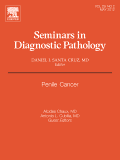
SEMINARS IN DIAGNOSTIC PATHOLOGY
Elevating standards in diagnostic pathology education.Seminars in Diagnostic Pathology is a premier journal that has established itself as an essential resource in the field of pathology since its inception in 1984. Published by W B Saunders Co-Elsevier Inc, this journal boasts an impressive Q1 ranking in the pathology category for 2023, placing it in the top tier of medical journals worldwide. With a focus on diagnostic pathology, it offers a platform for groundbreaking research and advancements that bridge the gap between basic science and clinical practice. The journal is committed to publishing high-quality review articles, case reports, and expert opinions that provide valuable insights for professionals, researchers, and students alike. Although it operates on a subscription model, the journal's extensive impact is reflected in its Scopus rank (#56/208), with a remarkable 73rd percentile standing in the pathology and forensic medicine category. The journal's authoritative content not only aids in enhancing knowledge but also fosters an understanding of the evolving challenges and methodologies in diagnostic pathology, making it an indispensable tool for anyone dedicated to excellence in the field.
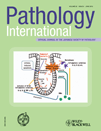
PATHOLOGY INTERNATIONAL
Elevating Research in Pathology and Forensic MedicinePATHOLOGY INTERNATIONAL, published by WILEY, stands as a distinguished journal in the field of pathology and forensic medicine, serving as an essential resource for researchers, clinicians, and students alike. With its ISSN 1320-5463 and E-ISSN 1440-1827, PATHOLOGY INTERNATIONAL has established itself since its inception in 1951, navigating through an evolving landscape in medical science with insights and breakthroughs up to 2024. It holds a commendable Q2 ranking in both the Medicine (miscellaneous) and Pathology and Forensic Medicine categories, indicating its robust influence and quality within these fields, as evidenced by its placement in the 70th percentile of Scopus rankings. While currently not an open-access journal, it provides access options that ensure valuable research remains available to the academic community. PATHOLOGY INTERNATIONAL commits to advancing the discipline through pioneering research articles, comprehensive reviews, and expert opinions that push the boundaries of understanding in pathology, thereby supporting the enhancement of diagnostic and therapeutic practices.

CANCER SCIENCE
Connecting researchers and clinicians to transform cancer care.Cancer Science, an esteemed journal published by Wiley, stands at the forefront of oncology research, boasting an impressive impact factor and a classification in the Q1 category for its contributions in Cancer Research, Medicine, and Oncology as of 2023. Since its inception in 2003 and transitioning to an Open Access model in 2014, the journal has facilitated global dissemination of critical research findings, ensuring that vital information remains accessible to researchers, clinicians, and students alike. With its comprehensive scope covering cutting-edge discoveries in cancer biochemistry, genetics, and molecular biology, Cancer Science is recognized for its rigorous peer-review process and significant contributions to advancing our understanding of cancer. The journal, located at 111 River St, Hoboken, NJ, is an essential resource for anyone dedicated to improving treatment outcomes and pushing the boundaries of cancer research.
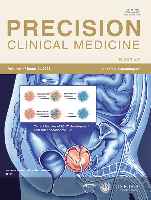
Precision Clinical Medicine
Navigating the complexities of personalized treatment.Precision Clinical Medicine, published by Oxford University Press, is an esteemed open-access journal that has been at the forefront of clinical research since its inception in 2018. With an ISSN of 2096-5303, this journal specializes in the rapidly evolving field of precision medicine, which aims to tailor healthcare to individual patient characteristics, needs, and preferences. As a testament to its influence, Precision Clinical Medicine holds a remarkable rank of #34 out of 636 in the General Medicine category on Scopus, placing it within the 94th percentile of its field and earning a prestigious Q1 rating in 2023. Based in the United Kingdom, the journal not only provides open access content, ensuring that groundbreaking research is widely disseminated, but also serves as a crucial platform for innovations and discussions that shape modern medical practices. Researchers, professionals, and students alike will find valuable insights and influential studies that drive the future of personalized healthcare within its pages.

VIRCHOWS ARCHIV
Advancing the Frontiers of Medicine and PathologyVirchows Archiv, published by Springer, is an esteemed journal dedicated to the fields of Medicine and Pathology, featuring high-quality research from various domains including Cell Biology and Molecular Biology. With its inception dating back to 1947, Virchows Archiv has been a pivotal platform for advancing the understanding of pathological and forensic medicine. As evidenced by its impressive Scopus rank, placing it within the top 15% of journals in Pathology and Forensic Medicine, it continues to maintain a strong presence with a Q1 classification in its category as of 2023. Although it does not offer Open Access options, the journal remains critical for researchers and professionals seeking to publish and access pioneering findings that can impact clinical practices and the academic community. The journal’s rigorous peer-review process ensures that only the highest quality research is disseminated, making it an essential resource for those engaged in the ever-evolving fields of health and biological sciences.

npj Breast Cancer
Empowering researchers to combat breast cancer effectively.npj Breast Cancer, published by NATURE PORTFOLIO, stands at the forefront of breast cancer research as an esteemed open access journal since 2015. With its impressive trajectory, the journal has garnered a notable impact within the academic community, reflecting a Q1 ranking in prestigious categories such as Oncology, Pharmacology, and Radiology for 2023. Based in the United Kingdom and indexed under E-ISSN 2374-4677, npj Breast Cancer aims to disseminate cutting-edge research that fosters innovation in prevention, diagnosis, and treatment of breast cancer, thereby addressing one of the most pressing health issues of our time. Its placement within Scopus rankings, including a remarkable 19th position in Pharmacology and a percentile ranking in the 90th range for Radiology and Oncology, highlights its significance as a key resource for researchers, healthcare professionals, and policy-makers dedicated to advancing cancer care. Emphasizing accessibility and high-quality content, npj Breast Cancer provides an influential platform for interdisciplinary collaboration and discovery in the ongoing battle against breast cancer.
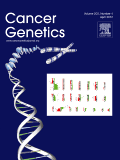
Cancer Genetics
Advancing Cancer Research Through Genetic InsightsCancer Genetics is an esteemed peer-reviewed journal dedicated to advancing the field of cancer research through the lens of genetics. Published by Elsevier Science Inc and available in both print (ISSN: 2210-7762) and online (E-ISSN: 2210-7770), this journal aims to provide a platform for the dissemination of high-quality studies that unravel the genetic underpinnings of cancer. Since its inception in 2011, Cancer Genetics has become a significant resource for researchers, professionals, and students with a shared interest in understanding the intricate relationship between genetics and oncogenesis. With an impact factor that reflects its influence, the journal has maintained a Q3 ranking in Cancer Research, Genetics, and Molecular Biology as of 2023, indicating its growing importance in these fields. Additionally, the journal offers open access options to ensure that crucial findings are easily accessible to the global research community. By bridging the gap between genetics and cancer studies, Cancer Genetics plays a pivotal role in fostering innovation and collaboration among scientists and clinicians striving to improve cancer diagnosis and treatment.
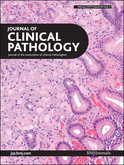
JOURNAL OF CLINICAL PATHOLOGY
Transforming Findings into Clinical PracticeJOURNAL OF CLINICAL PATHOLOGY, published by BMJ PUBLISHING GROUP, stands at the forefront of advancements in the field of clinical pathology, offering a platform for groundbreaking research and insights from 1948 to the present. With an impressive impact factor and categorized as Q1 in both Medicine (miscellaneous) and Pathology and Forensic Medicine for 2023, the journal holds a distinguished position in the academic community, ranking 22nd out of 208 journals in its category on Scopus and representing the 89th percentile. While the journal does not currently offer open access, it remains a vital resource for researchers, healthcare professionals, and students seeking to stay current with innovative methodologies, clinical techniques, and diagnostic advancements. Located in London, United Kingdom, the journal aims to bridge the gap between laboratory findings and clinical practice, emphasizing the importance of evidence-based pathology in improving patient care and treatment outcomes. Engage with the JOURNAL OF CLINICAL PATHOLOGY to enhance your understanding and contribute to the evolving landscape of clinical pathology research.

Pathologie
Empowering Researchers in the Dynamic Field of PathologyPathologie is a distinguished academic journal published by Springer Heidelberg, dedicated to advancing the field of pathology and forensic medicine. With an ISSN of 2731-7188 and an E-ISSN of 2731-7196, this journal serves as a vital platform for researchers, professionals, and students to disseminate innovative findings and insights. Currently ranked in the Q3 category of pathology and forensic medicine according to the 2023 metrics, Pathologie reflects a commitment to quality and relevance in a dynamic research landscape. Despite its relatively recent establishment from 2022, the journal is gaining traction with a Scopus rank of 139 out of 208 in its category, positioning itself as an emerging resource within the academic community. While it operates under a subscription model, the importance of the journal lies in its objective to facilitate the exploration of diverse pathological processes and enhance forensic methodologies, ultimately improving clinical outcomes and investigative practices. As it continues to grow, Pathologie stands poised to impact the pathology domain significantly.